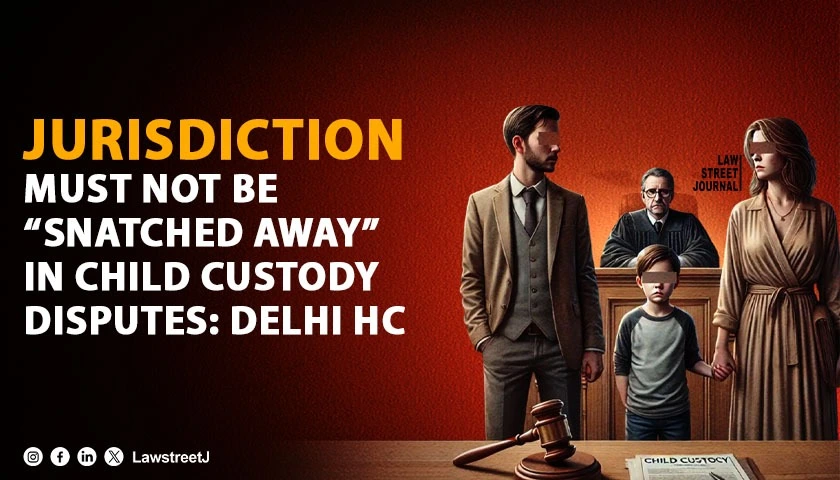New Delhi: The Delhi High Court recently held that courts must ensure their jurisdiction is not “snatched away” in child custody disputes involving foreign nationals who may flee the country, emphasizing that the entire process of adjudication would be rendered meaningless if courts were unable to implement or enforce their orders.
A Division Bench comprising Justice Anil Kshetarpal and Justice Harish Vaidyanathan Shankar observed that the various concerns and considerations that must be given primacy would only come into play once the legal system is permitted its free play, an important facet of which is the ability to have decisions enforced and implemented. The court emphasized that if this basic foundational feature were absent, the entire exercise would be rendered futile.
The appellant/mother preferred the present appeal under Section 19 of the Family Courts Act, 1984, challenging the order dated February 1, 2025, passed by the learned Judge, Family Court, Patiala House Courts, New Delhi, in Guardianship Petition No. 37/2024. The impugned order granted interim custody of the child to the respondent/father and dismissed the appellant’s application seeking recall of earlier orders restraining her from leaving India with the child without the court’s prior permission.
The parties were married on March 10, 2013, in accordance with Hindu rites and ceremonies. The appellant, a Christian by birth, converted to Hinduism for the purpose of marriage. After the wedding, the couple lived together in Noida and later in Dehradun, Uttarakhand. They were blessed with a baby girl on June 8, 2021. The daughter was born in Russia and holds a Russian passport. After her birth, the parties returned to India and continued residing in Dehradun.
The appellant left the respondent’s company, alleging physical and mental abuse. She took refuge at various places, including briefly at the Russian Embassy in Delhi, and was currently residing in Goa with the minor daughter. A divorce petition filed by the appellant was pending adjudication.
The respondent had preferred a petition under Sections 7, 8, and 9 of the Guardians and Wards Act, 1890, before the Family Court, Dehradun, which was subsequently transferred to the Family Court, Patiala House Courts, Delhi, by the Supreme Court’s order dated August 13, 2024. The Family Court, Dehradun, had earlier restrained the appellant from leaving India with the child without prior permission of the court.
The principal question for consideration was the extent to which the provisions of Section 6 of the Hindu Minority and Guardianship Act, 1956 (HMG Act), would have to be accorded primacy in a scenario where there exists more than a reasonable apprehension of a party removing themselves from the jurisdiction of Indian courts.
The learned senior counsel for the appellant contended that Section 6 of the HMG Act provides that the natural guardian of a Hindu minor under five years of age is ordinarily the mother. He further argued that the impugned order does not record any finding of fault or deficiency against the appellant, and without such a finding, the statutory provision must be given full effect. Since the child is under five years of age, custody should rest with the mother.
Per contra, counsel for the respondent contended that the appellant, a foreign national holding a Russian passport (as is the minor), has been living a nomadic life with no stable income or secure residence. Given the past attempts to secure exit permits, there was a more than reasonable apprehension that the appellant would flee the country with the minor child, effectively nullifying ongoing legal proceedings in India.
The High Court held that the impugned order—being an interim order pending final adjudication—did not warrant interference. The Family Court’s primary concern was the risk of the appellant and child leaving India. The Family Court observed that although a minor below five years should ordinarily remain with the mother, exceptional circumstances could justify granting custody to the father. Considering the father’s stability, means, and rootedness in society, the Family Court found that interim custody with the father would best serve the child’s welfare.
The High Court agreed, noting that the Family Court had correctly prioritized the welfare and best interest of the child, which is of paramount importance and outweighs the competing rights of the parents.
The Court also noted that the Russian Embassy had previously assisted the appellant in securing exit permits and that the appellant had expressed, in a legal notice dated September 25, 2023, her desire to leave India permanently. Referring to the Viktoriia Basu v. State of West Bengal case—where a similar situation led to a child being removed from Indian jurisdiction—the Bench stressed the need to safeguard judicial authority from being “snatched away.”
The Court observed that India is not a member of the Hague Conference on Private International Law, whereas Russia is. Therefore, any enforcement of Indian court orders abroad would depend solely on diplomatic channels.
Noting that the minor has been raised in India since birth and has adapted to the local environment, the Court held that it would not be in the child’s best interest to be uprooted at this stage.
Accordingly, the appeal and pending applications were dismissed.
Case Title: IT v. ANT
Case No.: MAT.APP.(F.C.) 55/2025
Date of Judgment: November 4, 2025
Coram: Justice Anil Kshetarpal and Justice Harish Vaidyanathan Shankar
For the Appellant: Sr. Adv. M. Dutta; Advs. Aditya Guha & Anand Kumar Soni
For the Respondent: Advs. Usha Mann, Deepak Gupta & Vijayat M. Bhalla



![Delhi High Court Sets Aside Arbitral Tribunal's Award Against NHAI in Highway Project Delay Case [Read Judgment]](/secure/uploads/2023/07/lj_9605_23374c2e-392c-4491-a2fe-f2f12fc5272f.jpg)
![Delhi Court Rejects Stay Request in Defamation Case Against Rajasthan CM Ashok Gehlot [Read Order]](/secure/uploads/2023/08/lj_5208_80de1ddc-d76a-4f7f-b180-408e3ae14fb4.jpg)







